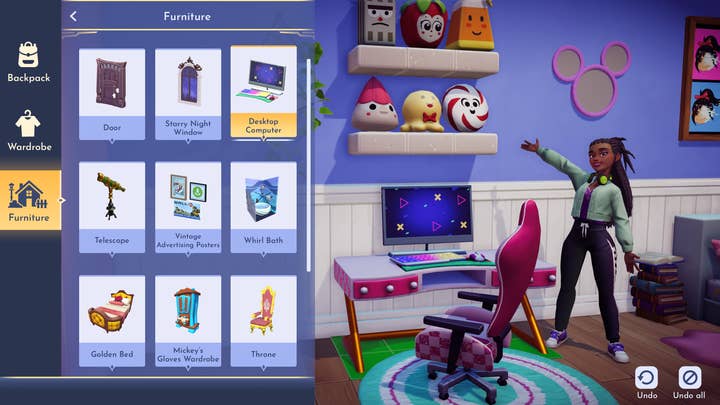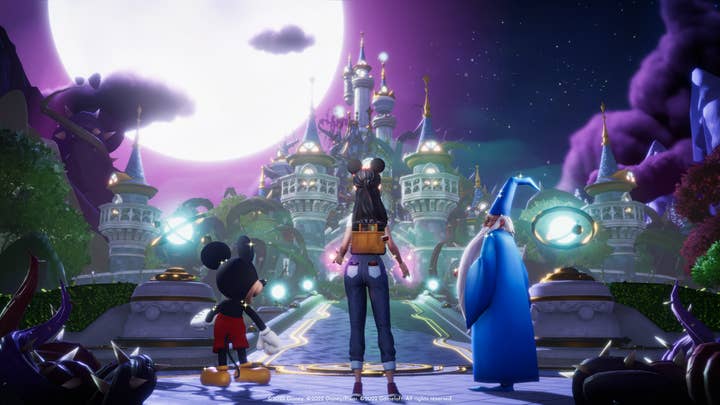Disney Dreamlight Valley reaffirms Gameloft's path to consoles and PC
CFO Alexandre de Rochefort says company is expanding from mobile to further diversify portfolio and business models
Sign up for the GI Daily here to get the biggest news straight to your inbox
Gameloft has long been a big name in mobile publishing, but the company's latest hit, Disney Dreamlight Valley, is exclusive to consoles and PCs. Shortly after its September 6 release, it was revealed that the game built up a player base of one million, and parent company Vivendi attributed the game with driving a 48% year-over-year jump in Gameloft revenues.
Speaking with GamesIndustry.biz, Gameloft general manager and CFO Alexandre de Rochefort explains that the expansion to consoles and PC is driven by a desire to turn the long-time mobile specialist into a major cross-platform publisher.
"Because of the technical convergence between what we can do on an iPhone or Android phone, it felt that we were more than capable of going from mobile to console specifically," de Rochefort says.
He adds, "If we look at the iPhone, we know that it's as powerful or even more powerful than a Nintendo Switch, so the step to take for us as a developer was not that significant."
If console and PC efforts like Disney Dreamlight Valley continue to be successful, Gameloft would be open to the idea of porting them to mobile devices.If console and PC efforts like Disney Dreamlight Valley continue to be successful, Gameloft would be open to the idea of porting them to mobile devices. De Rochefort acknowledges while mobile gaming commands a large market share of the industry, Gameloft has been somewhat too reliant on it.
"We tend to forget that console and PC segment is half of the market"
"There's a lot of talk about mobile because it's been the fastest growing segment of the video game space, but in our opinion sometimes we tend to overdo it and that's us a mobile gaming company talking to you here," he admits. "But we tend to forget that console and PC segment is half of the market or slightly less than half."
Diversification isn't an entirely new concept for the company. Gameloft’s publishing business includes both licensed titles and its own existing IPs. De Rochefort says that for the first nine months of the year, two-thirds of its revenue was generated from its brands and series.
He further explains that figure has been the same for the past six years. De Rochefort attributes the earnings split to having Gameloft's IPs available across different platforms such as its Asphalt series, which is on mobile, PC, and console.
He adds, "We try most of the time to continue exploiting those brands and pushing them on mobile and console."
This has also helped the company eventually adapt its business to include different monetization approaches.
"The thinking was that going towards PC and console will also allow us to be exposed to more than just one business model. The free-to-play business model has been dominant for the past 10 years," de Rochefort said.
"Going towards PC and console will also allow us to be exposed to more than just one business model"
"Going to PC and console was also a way of giving us more opportunities. Looking at each game, some games are just better fitted for a premium business model."
Dreamlight Valley, for example, is a licensed game but unlike most of Gameloft's games, it has no microtransactions. De Rochefort explains that its release allowed the company to embrace different business models for monetization.
"So we've made a deal with Microsoft, to have the game available on Game Pass, which exposes us to that subscription model. We put [the game on] Steam Early Access with the possibility for players to pay for the game between $30 and $70. But it's a free-to-play game at the end of the day," he said.
De Rochefort says matter of factly, that having subscription, free-to-play, and pay-to-play models was a good idea to diversify its strategy for the game. Following Dreamlight Valley’s performance, he notes that the multi-tiered approach won’t be a one-off scenario.
He adds, "It won't just be limited to Dreamlight Valley and it will depend on the kind of games and the expectations of the players from what we've seen. But we had that in mind from the beginning, having multiple business models for players available."

Dreamlight Valley has drawn more than a few comparisons to Nintendo's Animal Crossing: New Horizons. However, de Rochefort says that it didn't influence Gameloft's Disney adventure title, which had actually been pitched to Gameloft parent Vivendi in 2019, the year before New Horizons debuted and became a pandemic-era phenomenon.
However, he does acknowledge that seeing Animal Crossing's performance in 2020 was encouraging.
"When we saw Animal Crossing making a killing during the confinement, we were quite happy because it sort of confirms that the idea was quite good," he adds.
When reflecting on how Dreamlight Valley has performed so far, de Rochefort highlights that it represents the company's expertise to recognize and maximize a game's market opportunity.
"[Dreamlight Valley] is the biggest release in the history of the company"
De Rochefort expounds, "We're not trying to compete head-to-head against a Call of Duty or [Activision Blizzard] or Take-Two with arcade games.
"We're looking at those [titles] all over again as a game-as-a-service as we've been doing on mobile for the past ten years. So, we adjust the investment in relation to the success of the game."
That investment may be adjusted upward significantly, considering de Rochefort says, "[Dreamlight Valley] is the biggest release in the history of the company."

